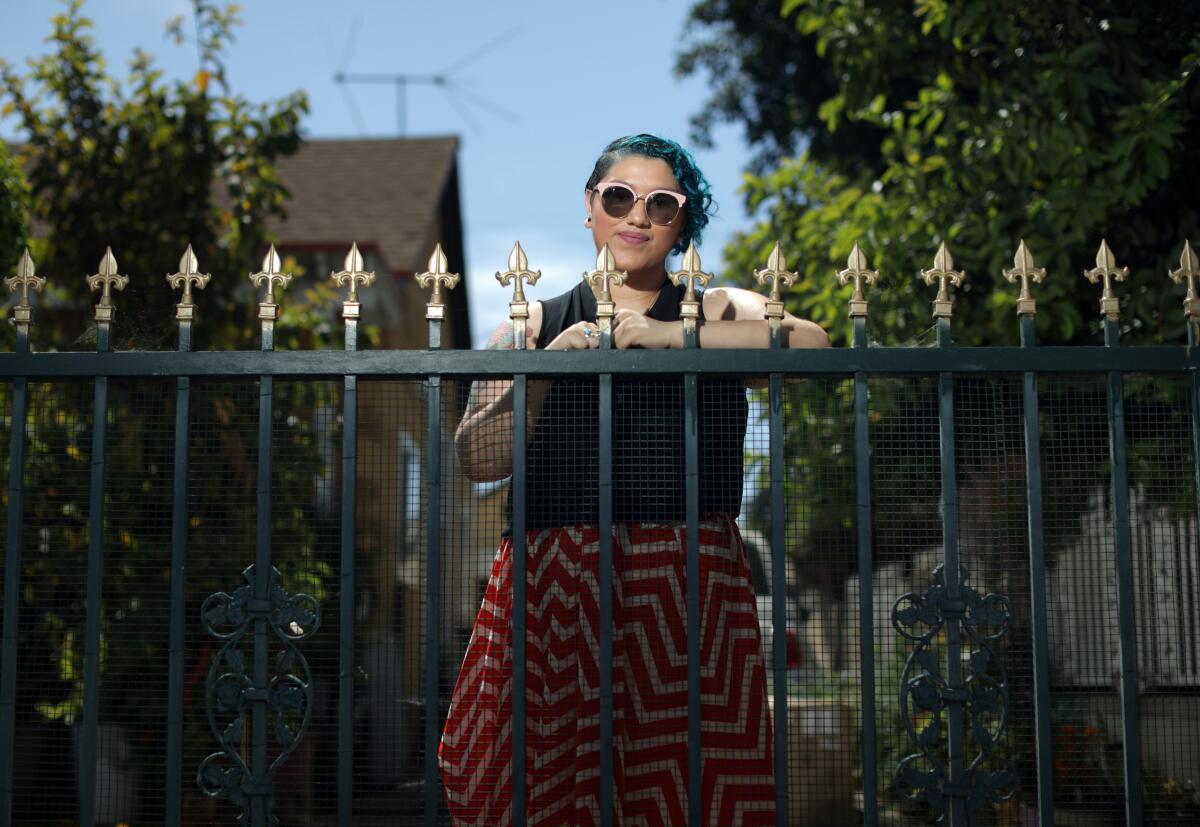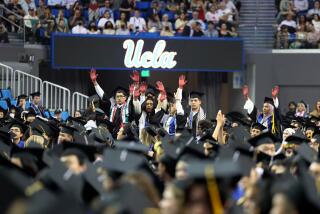My students earned the cap and gown, but they’ll miss out on the day they dreamed about for years

- Share via
Isabeau Noga of Boyle Heights was looking forward to walking across a stage next month, with friends and family coming from as far away as Arizona to celebrate her college graduation.
And she had good reason to be proud.
For her first writing project in my class this semester at Cal State L.A., Noga composed a powerful essay about her many trips to Children’s Court over the course of 10 years. She called the paper “All Rise,” the words called out by the bailiff when the judge enters the room.
“I went through 11 foster homes, one group home and three placements in a mental institution,” wrote Noga, now 23.
It was hard to say goodbye to the judge and bailiff and other court officers on her last visit, Noga said in her essay. The bailiff had handed her stuffed animals over the years and the judge always tried to find a safe place for her. But when she was nearly 18, she was adopted, got one last teddy bear from the bailiff, and her new life began.
“I graduated high school early,” Noga wrote, “got an Associate’s Degree in Arts and Humanity, and was accepted to all the universities that I applied to, all because [my mother] stood by me and guided me to a happier life.”
Across the land, students graduating from college and high school are missing out on their big day because of social distancing protocols during the pandemic. Like Noga, they’ll all get through this, the diplomas will still be printed and distributed, and in some cases traditional ceremonies may be held at a later date.
But to some of my students, and their families, the caps and gowns would have meant a lot. Most of the students I’ve taught over the last four years have been the first in their immigrant families to go to college, and many of them have been in school for more than the usual four years, because they‘ve had to juggle part-time or full-time jobs and look after loved ones.
Dr. David Olsen, chair of the Communications Department, told me he’s seen a lot of graduations over the years at various campuses, but nothing like the spectacles of celebration at Cal State L.A., where the pomp punctuates dreams that have come true.
“It’s a huge party for families and it’s so festive and boisterous and lively,” Olsen said. “The ceremony is such a big thing for them that it’s incomprehensible to me that it’s not going to happen in a few weeks. It’s tragic.”
School President William Covino insists on personalizing the ceremony by shaking the hand of every one of the thousands who graduate each year, said Olsen. After the ceremonies — which have been held in recent years in the CSULA football stadium or the gym — students are eager to introduce parents and loved ones to their professors.
Some students are working hard to make the day special despite the challenges. As part of a group project in Rob Allen’s Intercultural Communications class, graduating senior Danielle Chavez-Duran is helping compile a virtual graduation video. Communications students are submitting photographs and comments about their CSULA experience, and a slide-show video will be set to music, with the video available to grads.
Chavez-Duran said that in many of the photos she’s getting, students are decked out in the caps and gowns they had already purchased.
One of my students, 26-year-old Max Garcia, started attending college nine years ago. He’ll be the first college graduate in his family, and he said his siblings were even more excited than he about the graduation ceremony.
“I was going to order my cap and gown in May,” said Garcia, who has held one or two jobs the entire time he’s been in college, and works now as a home health aide.
Garcia, a musician, had planned to become an English teacher. But he’s having second thoughts now that all his classes, including mine, have gone digital. Digital education doesn’t look so appealing to him, so Garcia is thinking about going after a graduate degree in computer science. Nobody knows how long the coronavirus will disrupt normal routines, he reasons, and maybe virtual interaction will be more common going forward.
My student Oliver Rivera wrote during an in-class assignment that he felt bad for his parents as much as for himself. They came to the U.S. so their children would have more opportunities than they had, Rivera wrote. And he had so wanted to see them “reap the rewards” of their sacrifices when he walked the stage.
Student Andy Chieng, whose parents journeyed here from Vietnam and Laos, had similar sentiments.
“This would have been a great payoff for all that struggling — the clearest evidence that they had succeeded,” said Chieng, a chemistry major. He’s been accepted to a doctorate program at Arizona State University, so they may still see him in a cap and gown one day.
Denae Ayala, a first-generation college graduate and a TV/Film major who wants to be a journalist, said that her family had planned to attend the ceremony and then host a party. Her mother is still pushing for at least a backyard celebration in Bakersfield, where she grew up, but Ayala has said maybe they should hold off until they’re sure a large gathering is safe.
Roni Rodriguez, 31, an English major who wants to be a lawyer, has been attending college since 2011. The graduation ceremony would have been more for her immigrant family than for her, Rodriguez said, so she’s sorry they’ll miss it.
“But they’re still happy I’m getting my degree,” she said.
Every semester in my class, which is about how to find and tell untold stories in Los Angeles, the big highlight is a visit from acclaimed poet laureate and author Luis Rodriguez, whose many books include the classic L.A. memoir “Always Running: La Vida Loca, Gang Days in L.A.”
Last Monday, Rodriguez — who is always greeted like a rock star by my students — joined our class through a video link. He offered his usual pep talk, writing advice and reminders about the value of voracious reading and unbridled perseverance.
Noga, a fine writer who keeps a journal and thinks she may want to continue her education and become a youth counselor, asked the author’s advice on how to get published. Rodriguez explained to her and others that there are no shortcuts, and no greater quality than perseverance. You have to write every day, he said, and good writing is essentially an endless commitment to rewriting.
I’m pretty sure Noga has a book in her, and “All Rise” wouldn’t be a bad title.
Her mother, Karen Noga, was Isabeau’s foster mother for several years. They hit some rough patches along the way, they both told me, but their commitment to each other was strong. It’s such a shame, Karen said, that the family won’t get to see Isabeau walk the stage. But they’re going to celebrate that degree, one way or another.
To Isabeau and all the others who will soon be at the finish line, congratulations, good luck — and wherever you may be next month on graduation day, let the caps fly.
More to Read
Sign up for Essential California
The most important California stories and recommendations in your inbox every morning.
You may occasionally receive promotional content from the Los Angeles Times.











